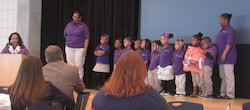Shannon's Window: The Class of 2028 needs you
- January 15, 2015
- / Shannon Nickinson
- / early-learning

Are you ready for the class of 2028?
Those who gathered at the ECARE breakfast at Sanders Beach Corrine Jones Community Center this morning got a glimpse of what that graduating class may hold.
The 10 sweet faces of the children from Top Notch Christian Academy who performed “Bear Snores On” with their teachers gave us a glimpse of the great promise our children hold.
As they grumbled and stomped and growled along with the story of a bear who nearly sleeps through a party in his own den, they showed what is possible when focused, dedicated volunteers and caregivers work together to give children the tools they need to be ready for school.
They know what onomatopoeia is, they have a song that helps them remember rhyming words and they clearly love what the world of books can bring them.
The statistics about the educational challenges facing kids who don’t get the help they need gave us a look at the very real challenges Pensacola faces if we fail those sweet faces.
— Only 67 percent of Escambia County 5-year-olds are considered “kindergarten ready.”
— Only 35 percent of our kindergarteners are ready to learn to read. By the end of the kindergarten year, it goes up, but only to 55 percent.
— Some 19 percent of this county’s third-graders read at the lowest reading level according to the state standardized test they take.
— Only 52 percent of our 10th graders are proficient at reading.
ECARE’s goal
ECARE — Every Child A Reader in Escambia — is a nonprofit that aims to improve the early literacy deficit that too many of Pensacola’s children face. In recent years, ECARE has narrowed its focus on areas that vice chairman John Hosman told the audience will have the biggest impact.
— Partnering with the school district in the professional development program for child care providers called Wee Read to help them learn the best strategies to help their young charges.
— Family Nights where parents are coached on the critical role they play and given strategies to make reading fun and engaging at home.
— A tutoring program called Reading Pals, that matches volunteers with children who need extra help.
ECARE works with child care centers in the neighborhood that feed into Global Learning Academy. They are on track to help 130 kids this school year, Hosman said. The goal for next year is 200.
Escambia Superintendent Malcolm Thomas told the crowd that that number may seem small, but consider this.
The population that gives him the most concern are the 18-20 percent of children in his kindergarten classrooms who show up for school two years behind where they should be.
“I can hold kindergarten teachers accountable for a year’s progress,” Thomas said. “But a year’s progress won’t be enough because these children will still be behind.”
That percentage equals about 450-500 students, Thomas said.
If ECARE can help 130 of them this year make up some of the ground they lack, that percentage gets dented.
And if they help 200 next year, and 250 the year after that, well, that’s how you eat the elephant, as they say.
“When you solve it there, you solve it for a lifetime,” Thomas said.
The village has changed
Escambia School Board member Linda Moultrie told the audience that as tired as they may be of the cliche that it takes a village to raise a child, it is true.
“(And) the village as we knew it is no longer there,” Moultrie said.
That’s why the education system, with its constantly changing demands, needs the community’s help to carry the message that the most important teacher every child has is their parent. But some of those parents don’t have the skills themselves to help the children in the class of 2027 and beyond.
“Help them to be more than than the statistics say they should be,” Moultrie said.
A lot of energy goes into talking about the need to improve the education system, but most of that energy focuses on the K-12 system.
“The longer I am in this business, the more I am convinced that to solve this community’s challenges long-term, it will begin long before a student walks in a school door,” Thomas said.
Which means the Class of 2027 needs us — all of us — invested in their progress. Now.
Without the come-to-Jesus moment in which we realize our community’s economic prospects are as closely tied to making sure 4-year-olds can identify at least seven letters of the alphabet as it is to providing shovel-ready commerce parks, we will keep missing the mark.
“What every parent, what every grandparent wants for their child is what every one of us should want for all the children in this community.”
 CivicCon launches with a look at good growth in cities
CivicCon launches with a look at good growth in cities
 Building stronger brains one baby, one parent at a time
Building stronger brains one baby, one parent at a time
 SCI debuts commercial on Early Learning City
SCI debuts commercial on Early Learning City
 Entrecon: World class speakers and an opportunity to sharpen skills
Entrecon: World class speakers and an opportunity to sharpen skills
 PYP Quality of Life survey 2017
PYP Quality of Life survey 2017
 EntreCon Pensacola 2016: A look back
EntreCon Pensacola 2016: A look back
 Leadership tip: getting better employee takeaways
Leadership tip: getting better employee takeaways
 Leadership tip: be interested instead of interesting
Leadership tip: be interested instead of interesting
 Leadership tip: delivering difficult messages
Leadership tip: delivering difficult messages
 Brain Bags boost Arc, Early Childhood Court programs
Brain Bags boost Arc, Early Childhood Court programs